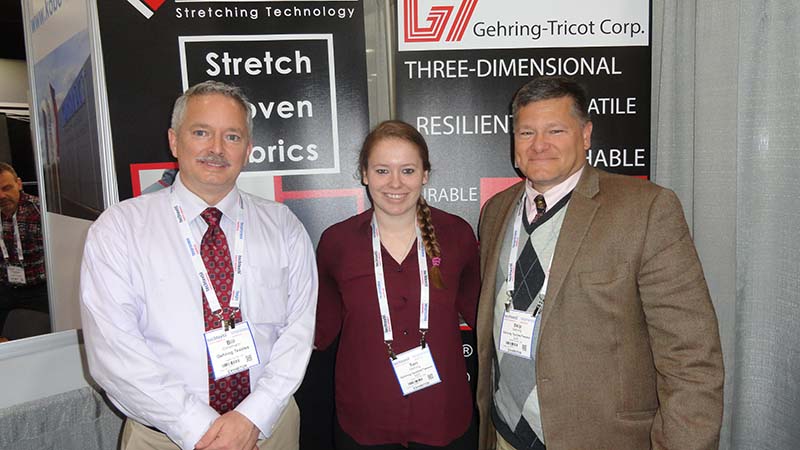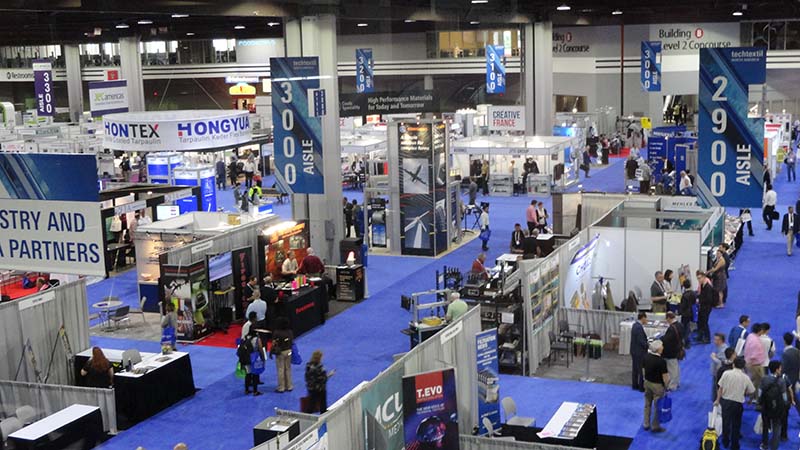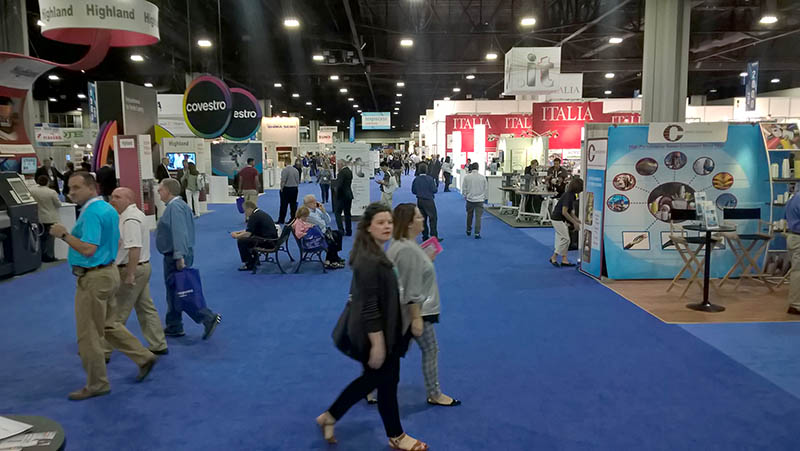More than 9,000 people attended TTNA in May, along with 351 exhibitors.
The 13th edition of Techtextil North America (TTNA), held May 3-5 at Atlanta’s World Congress Center, achieved positive results by most accounts. This year’s show housed 351 exhibitors and drew more than 7,000 attendees. Many exhibitors were pleased with the event’s traffic while others reported their objective was to let the world know they are open for business. As it did two years ago, TTNA shared an exhibit hall with Texprocess Americas and the JEC Composites show.
Perhaps the biggest gripe that could be heard on the show floor was about the IDEA show for nonwovens and engineered fabrics running simultaneously in Boston. That may have held down attendance and many exhibitors split their staffs to work both shows.
As Dennis Smith, president of Messe Frankfurt USA told reporters during a pre-show meeting, “It’s never good for the industry to have overlapping shows.”
Greenville-based Frankl & Thomas, which represents about 30 suppliers of spare parts to nearly all segments of the fiber and textile industries, is enjoying a good year and was pleased with the show. Mike Anderson, the company’s vice president, said 2015 was the best year the company had in the last decade, and this year is continuing on the same pace. The company’s momentum is propelled largely by two key acquisitions: Hurley & Harrison in 2007 and File and Davidson in 2014.
“We have pretty much closed the circle with these acquisitions,” Anderson said. “We have products for opening, spinning, warping, winding, weaving and even finishing.”
Anderson said he is hearing a lot of optimistic talk from his customers, especially those serving niches.
“We have customers like Willacoochee Industrial Fabrics in Willacoochee, Ga., and Lumite in Alto, Ga. Those guys are doing fantastic and running as hard and as fast as they can, so they are optimistic. For others, business isn’t quite as good, but we’re not hearing the pessimism that was there a few years ago.”
Anderson, who joined Frankl & Thomas in 1997, said that wasn’t always the case, citing a long line of weaving plants that closed in the late 1990s and early 2000s. “The industry is never going to be what it was, but it’s undergoing a resurgence and that’s encouraging.
Anderson said Frankl & Thomas has a lot of long-running relationships with clients with the oldest being Nippon Nozzle, a spinneret manufacturer that has been a client since the early 1970s.
Commenting on the scheduling conflict with the IDEA show, Anderson said, “That has been one of the main topics here. Why are shows being held at the same time? There certainly is plenty of room here to have everything here.”
Two of the industry’s prominent technical fabric producers, Glen Raven Technical Fabrics (GRTF), and Gehring Textiles, are long-time TTNA exhibitors. For Glen Raven, TTNA is mostly about flying the company’s banner at the industry’s biggest all-purpose trade show.
Harold Hill, GRTF’s president, said the company’s primary knitted product is fabric for automobile headliners. Last year was a record sales year for the automotive industry and 2016 could be even better. GRTF is reaping the benefits of this upward shift.
“It looks like it could be up even more this year,” Hill said. “We’re trying to get our fair share, innovate and bring new products to that market. Working with it on a global basis, we have seen lots of progress.”
Hill said that essentially nearly every automaker uses Glen Raven Fabric. That’s a departure from when the company started serving the automotive sector about a dozen years ago. Back then it was just the Big 3 U.S. automakers.
Asked to comment on the evolution of TTNA, Hill said, “This is a show where we are probably unlikely to meet many new customers. It’s a standard industry show and we are here, our competitors are here and our vendors are here. To miss the show would be conspicuously absent. It’s a chance to fly our banner and to make sure that everybody knows that Glen Raven Technical Fabrics is here and doing business.”
Hill noted that most of the shows in which GRTF participates are specialized events such as for FR fabrics, filtration fabrics or geosynthetics. These types of shows are the wave of the future, he said, but the breadth of the TTNA show still offers a good meeting place for the industry.
Gehring Textiles, headquartered in Garden City, N.Y., is a broad-based developer and manufacturer of highly technical custom fabrics for a broad range of uses. The company historically has one of the busiest booths at TTNA and this year was no exception. Skip Gehring, the company’s president, said over the course of a year, the company uses 162 different yarns. The company’s manufacturing capabilities are its strength, he said.

“We’ve made some great advances in spacer fabrics and we are investing in advanced spacer fabric machines with jacquard and electronic patterning capabilities,” Gehring said. “We are also expanding our warping capability and doing more beaming in house.”
Smart textiles and composites will be growing markets for the company in the future, he said.
Bill Christmann, the company’s vice president of sales and marketing, said innovative yarn companies need a top technical fabric partner to be their fabric resource for advances in fibers and Gehring Textiles fits that bill. Look for Gehring Textiles to make more acquisitions in the coming years. Gehring said the company is seeking to expand its capabilities.
Finding sufficient qualified labor seems to be the industry’s biggest current challenge. Gehring Textiles has developed an in-house training program to deal with the issue.
“It’s very difficult to find qualified labor,” Gehring said. “There are so few textile mills left in upstate New York where we have our warp knitting. There used to be 16 mills there. Now, we are the only one left. So we hire people who are mechanically inclined and then train them for the fabric part of it.”
On the machinery parts side, Spartanburg, S.C.-based Mezger Inc. is a regular exhibitor at TTNA. Mark Mezger, the company’s president, reported that while the show started slow, traffic picked up considerably by the second day. Mezger represents more than 30 companies around the world.
Regular exhibitor Fi-Tech reported that most of the opportunities from the show came from the textile side of the Richmond, Va. company’s business.
“With our business being very niche, it is difficult to give it a grade, but I feel the foot traffic was fair, and the level of contact was good,” said Fi-Tech’s Brian Williamson. “I would say that most visitors were not the main decision makers for us, however it was a good opportunity to make first contact.”
Coats Speciality attends several Techtextil events around the world including North America, India, and Germany and, in the near future, China. The company said TTNA is important because it is one of the larger exhibitions and appeals to a wide range of end use sectors allowing the opportunity to meet with existing customers and prospect new customers from many different industries.
Techtextil North America was a very successful exhibition for Coats, according to the company’s Leah Perkins. Coats saw an increase in foot traffic to his booth and the expo overall was very well attended. As well, the quality of companies in attendance was very good, she said.
Coats focused on four key areas: automotive, composites, fiber optics and FR/cut protection. Also, Coats Speciality Global Technology Director, Bill Stuckey, spoke on new technologies improving yarn durability and performance.
“Modern engineering is transforming what we can do with fibers,” said Stuckey, a 30-year textile industry veteran. “We’re able to explore modifications from disciplines other than textiles for performance enhancements and use them to create innovative solutions for threads and yarns. As a result, we can develop revolutionary solutions for end use sectors ranging from automotive to aramids to fiber optics.”

Mount Vernon Mills, which produces protective fabrics at its plant in Trion, Ga., exhibited at the Atlanta show for the second time. Michael Woods, vice president, FR fabric sales, said the overall market for protective fabrics is down about 25 to 30 percent from two years ago, primarily due to the low price of crude oil and the subsequent slowdown in drilling.
The Western version of Techtextil North America, held in odd-numbered years, moves to Chicago’s McCormick Place convention center June 20-22, 2017. Messe Frankfurt anticipates 150 exhibitors and 3,000 attendees to be on hand in the Windy City. Michael Jänecke, Messe Frankfurt’s director of brand management, technical textiles and textile processing, told a group of journalists that Messe Frankfurt has steadily grown and now organizes 132 trade fairs around the globe. The company has become the biggest organizer of textile shows with 49 events worldwide.


